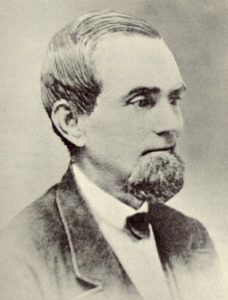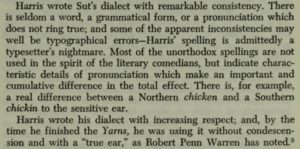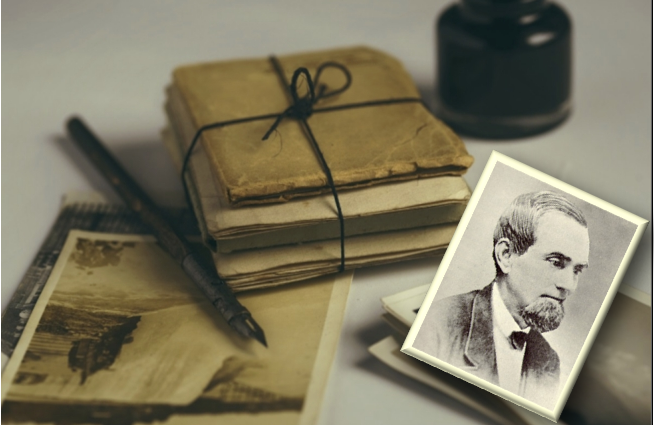 George Washington Harris was born in Allegheny City, Pennsylvania, on March 20, 1814. In 1819, Harris moved to Knoxville, Tennessee with his half-brother Samuel Bell, who was considerably older than Harris and to whom the latter eventually served as an apprenticed metalworker. Harris’s formal education was scant. Never settling into one profession, Harris was involved throughout his life in a number of occupations, such as metalworker, gentleman farmer, steamship captain, superintendent of the Holston Glass Works, postmaster, and railroad engineer. Regarding his career as a writer, Harris began contributing political articles to the Democratic Knoxville Argus and Commercial Herald in 1839, and in 1843 he published several sporting epistles in William T. Porter’s New York Spirit of the Times under the pseudonym “Mr. Free.” In addition, the Spirit provided Harris an outlet for his first full-length story, “The Knob Dance – A Tennessee Frolic,” which appeared in 1845 under the pseudonym “Sugartail.” Of most importance, Harris’s first Sut Lovingood story, “Sut Lovingood’s Daddy Acting Horse,” was printed in the November 4, 1854, issue of the Spirit.
George Washington Harris was born in Allegheny City, Pennsylvania, on March 20, 1814. In 1819, Harris moved to Knoxville, Tennessee with his half-brother Samuel Bell, who was considerably older than Harris and to whom the latter eventually served as an apprenticed metalworker. Harris’s formal education was scant. Never settling into one profession, Harris was involved throughout his life in a number of occupations, such as metalworker, gentleman farmer, steamship captain, superintendent of the Holston Glass Works, postmaster, and railroad engineer. Regarding his career as a writer, Harris began contributing political articles to the Democratic Knoxville Argus and Commercial Herald in 1839, and in 1843 he published several sporting epistles in William T. Porter’s New York Spirit of the Times under the pseudonym “Mr. Free.” In addition, the Spirit provided Harris an outlet for his first full-length story, “The Knob Dance – A Tennessee Frolic,” which appeared in 1845 under the pseudonym “Sugartail.” Of most importance, Harris’s first Sut Lovingood story, “Sut Lovingood’s Daddy Acting Horse,” was printed in the November 4, 1854, issue of the Spirit.
In 1858, Harris, a Confederate sympathizer, left Unionist East Tennessee for Confederate Nashville; however, he fled Nashville in 1862 – to escape the Union army. Afterwards he lived in several Southern cities, including Chattanooga, Tennessee; Decatur, Alabama; and Trenton, Georgia. In April 1867, Harris’s collection of stories, Sut Lovingood: Yarns Spun by a “Nat’ral Born Durn’d Fool,” which was set in East Tennessee’s Copper Basin area, was published in New York. After Harris’s first wife, Mary Emeline Nance, mother of his six children, died in 1867, he married the widowed Mrs. Jane E. Pride on October 19, 1869. Finally, in December 1869, after seeking publication for his new manuscript of stories entitled High Times and Hard Times in Lynchburg, Virginia, Harris fell ill on the return train trip home and was taken off the train at Knoxville, where he died on December 11, 1869, after having uttered the word poisoned. Although the cause of his death has remained an intriguing mystery, many people believe that Harris died from apoplexy. His unpublished manuscript has never been recovered.1)Biography taken with permission from: Francisco, Edward, Robert Vaughn, Linda Francisco, eds. (2001). The South in Perspective: An Anthology of Southern Literature. Upper Saddle River, New Jersey: Prentice Hall. p.375
Harris’s collection of short stories influenced several Southern authors. Mark Twain drew from Harris’s Sut Lovingood when he created Huckleberry Finn. Harris’s writing also helped shape William Faulkner‘s Snopes characters. Other writers influenced by Harris are Irving S. Cobb (who influenced H. P. Lovecraft), and Flannery O’Connor. Not everyone was a fan of Harris’s work, however. Literary critic and writer, Edmund Wilson, said Harris’s Sut Lovingood was “the most repellent book of any real literary merit in American literature.” Wilson’s criticism likely stemmed from Harris’s use of mountain dialect. Harris was very careful to represent true Appalachian English in the Sut Lovingood stories so the dialect is almost entirely comprised of phonetic spelling. Note this information from a small selection in Milton Rickels’s biography2)Rickels, M. (1965). George Washington Harris. New York: Twayne Publishers, Inc. p. 111of Harris:

For proper representation, the following is an excerpt from the section “Parson John Bullen’s Lizards” in Sut Lovingood: Yarns Spun by a “Nat’ral Born Durn’d Fool; Warped and Wove for Public Wear”:
AIT (8$) DULLARS REW-ARD.
“TENSHUN BELIEVERS AND KONSTABLES!
KETCH ‘IM! KETCH ‘IM!
This kash wil be pade in korn, ur uther projuce, tu be kolected at ur about nex camp-meetin, ur thararter, by eny wun what ketches him, fur the karkus ove a sartin wun SUT LOVINGOOD, dead ur alive, ur ailin, an’ safely giv over tu the purtectin care ove Parson John Bullin, ur lef’ well tied, at Squire Mackjunkins, fur the raisin ove the devil pussonely, an’ permiskusly discumfurtin the wimen very powerful, an’ skeerin ove folks generly a heap, an’ bustin up a promisin, big warm meetin’ an’ a making the wicked larf, an’ wus, an’ wus, insultin’ ove the passun orful.
Test, JEHU WETHERO
Sined by me,
JOHN BULLEN, the passun.3)Francisco, Edward, Robert Vaughn, Linda Francisco, eds. (2001). The South in Perspective: An Anthology of Southern Literature. Upper Saddle River, New Jersey: Prentice Hall. p. 376
**Featured Image Source: pxhere
References
| ↑1 | Biography taken with permission from: Francisco, Edward, Robert Vaughn, Linda Francisco, eds. (2001). The South in Perspective: An Anthology of Southern Literature. Upper Saddle River, New Jersey: Prentice Hall. p.375 |
|---|---|
| ↑2 | Rickels, M. (1965). George Washington Harris. New York: Twayne Publishers, Inc. p. 111 |
| ↑3 | Francisco, Edward, Robert Vaughn, Linda Francisco, eds. (2001). The South in Perspective: An Anthology of Southern Literature. Upper Saddle River, New Jersey: Prentice Hall. p. 376 |






